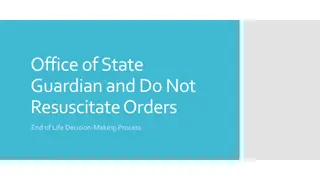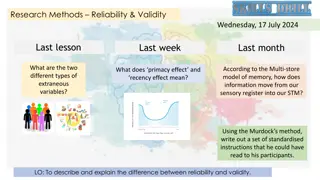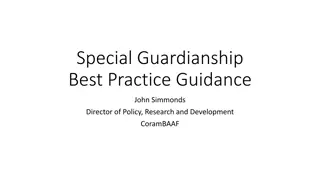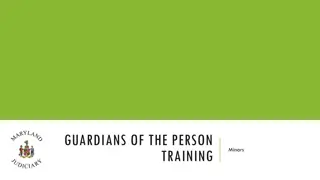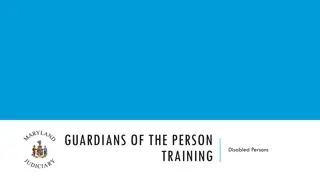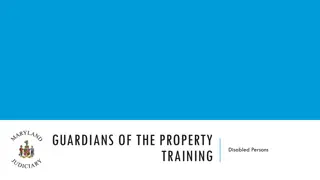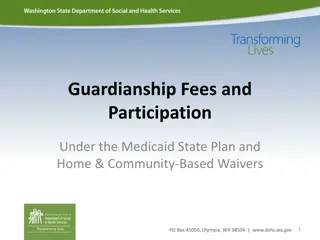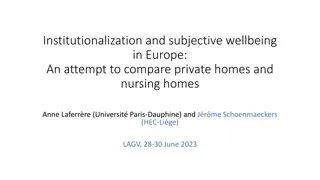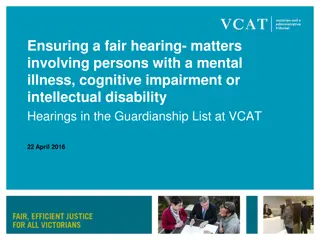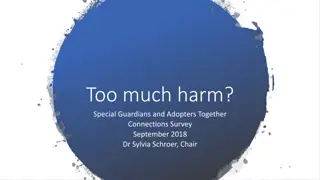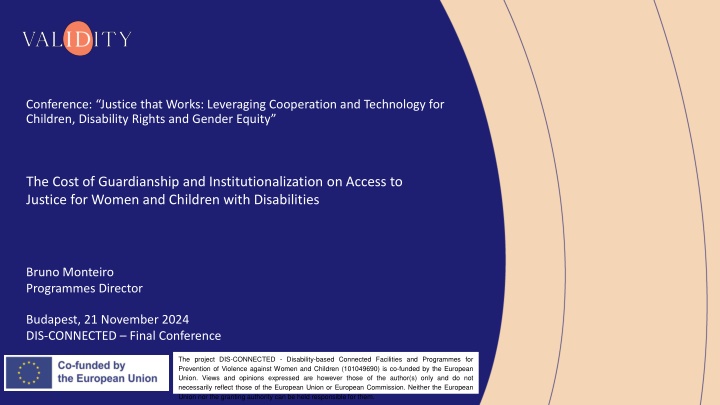
Access to Justice for Women with Disabilities in the EU
Explore the challenges faced by women with disabilities in accessing justice in the European Union, focusing on issues of guardianship, institutionalization, and gender-based violence. Learn about initiatives aimed at addressing these barriers and promoting equality under the law.
Download Presentation

Please find below an Image/Link to download the presentation.
The content on the website is provided AS IS for your information and personal use only. It may not be sold, licensed, or shared on other websites without obtaining consent from the author. If you encounter any issues during the download, it is possible that the publisher has removed the file from their server.
You are allowed to download the files provided on this website for personal or commercial use, subject to the condition that they are used lawfully. All files are the property of their respective owners.
The content on the website is provided AS IS for your information and personal use only. It may not be sold, licensed, or shared on other websites without obtaining consent from the author.
E N D
Presentation Transcript
Conference: Justice that Works: Leveraging Cooperation and Technology for Children, Disability Rights and Gender Equity The Cost of Guardianship and Institutionalization on Access to Justice for Women and Children with Disabilities Bruno Monteiro Programmes Director Budapest, 21 November 2024 DIS-CONNECTED Final Conference The project DIS-CONNECTED - Disability-based Connected Facilities and Programmes for Prevention of Violence against Women and Children (101049690) is co-funded by the European Union. Views and opinions expressed are however those of the author(s) only and do not necessarily reflect those of the European Union or European Commission. Neither the European Union nor the granting authority can be held responsible for them.
Access to Justice for Women with Disabilities Multiple initiatives on Access to Justice: Defendants with intellectual or psychosocial disabilities (ENABLE) See Report: Fair Trial Denied: Defendants with Disabilities face Inaccessible Justice in the EU Women and Children Victims of Gender-Based Violence in facilities and programmes that aim to serve them (DIS- CONNECTED); Voices of: 33 women with intellectual or psychosocial disabilities (as victims, including as children) 5 EU countries 10 women with intellectual or psychosocial disabilities (as defendants) 8 EU countries 9 European Union Countries: Bulgaria, Czechia, Hungary, Lithuania, Portugal, Romania, Slovakia, Slovenia, Spain Methods: semi-structured interviews, focus groups and desk research (laws, case-law, strategies, policy documents;
[When] I started mentioning the sexual [violence], I dont think they really believed me. They think that everything is caused by the psychosis. Bulgarian woman with intellectual disabilities Being a woman and having an intellectual disability feels like a doubled disadvantage. My peers are often taken advantage of because they receive no sexual education and don t understand what is happening to their bodies. Attitudinal and Barriers Hungarian woman self-advocate with intellectual disabilities I made a lot of complaints. But nothing ever came of it. There was one time when the police ... I filed a complaint with the police and they called me "crazy". Portuguese woman with intellectual disabilities
Legal Capacity Including the capacity to be a holder of rights , entitling the person to full protection of his or her rights by the legal system , and the capacity to be an actor under law , recognised as an agent with the power to engage in transactions and in general to create, modify or end legal relationships In the Justice system: Recognised power to make a criminal complaint; Make decisions about their case (not their lawyer or family/guardian); Make decisions about the support they want; Make decisions about what adjustments are appropriate to them in proceedings; Supported decision-making is key;
Guardianship laws: Continue to exist in Bulgaria, Lithuania, Hungary and Slovakia; Guardianship formally repealed in Portugal, although access to supported decision-making requires showing that person cannot exercise their own rights autonomously; Guardianship still viewed as form of protection both for women and children Bulgaria and Hungary; How has Legal Capacity been Respected? [After] he was discharged from the hospital, they put him under guardianship, his mother became the guardian, the one who neglected him. [He] remained in extreme dependency . Bulgarian Support Worker Justice and legal professionals prefer to communicate directly to guardian/family Bulgaria, Hungary, Lithuania Rights in legal proceedings are limited: Cannot make a complaint without guardian; Cannot participate in proceedings autonomously Slovakia
Independent Living All persons with disabilities have the right to live in community and choose where they want to live, with whom and have access to a range of of in-home, residential and other community support services, including personal assistance necessary to support living and inclusion in the community Institutionalization is discriminatory, leads to de facto denial of the legal capacity and constitutes detention and deprivation of liberty based on impairment; Institutionalization contradicts the right of persons with disabilities to live independently and be included in the community. State-parties should abolish all forms of institutionalization and refrain from new placements; Deinstitutionalization is necessary to access justice;
Institutionalization remains an established practice in all 5 EU countries; Institutions, including small group homes, are viewed by professionals as form of protection both for women and children Bulgaria, Lithuania, Hungary and Slovakia; Creates environment of dependency on guardians/institution personnel to access support Bulgaria, Hungary, Slovakia; How has the right to Independent Living been Respected? It's a very strong dependency situation. They're more afraid of the uncertainty of, if I report and say I'm out of this family or I'm out of this institution, what's in store for me? Or they are afraid of retaliation. Hungarian Special education teacher and researcher Self-monitoring is inadequate: [There is]... ( ) cigarette-coffee bullying. [W]e try to make it work somehow but they can't defend themselves and we can't go to every client. Slovak employee in a residential institution See ECHR Case of T.J v. Hungary (application no. 31970/20) (2024) the refusal of the state-imposed guardian to take any meaningful steps to address the horrific treatment that resulted in the death of Ms. T.J., a 45-year-old woman with an intellectual disability who was detained in the Toph z institution since 1983;
Procedural Accommodations are individualized: Well, they [the police investigators] asked me if understand and I said yes because I was embarrassed to say no. [ ] I was very nervous. [ ] I was not going to say anything [if her therapist was not with her during the interrogations]. Respectful Treatment and active listening: There have to be people who know how to listen and understand what humiliation is (...). Sometimes, (...) I wanted someone to (...) hug me, to give me a little comfort. I've never had that in my life. (...) The problem is knowing how to listen, knowing how to understand. Procedural Accommodations Recommended by Women with Disabilities: Use of intermediaries /communication facilitators (Piloted in Bulgaria, Spain, UK); Available information in easy to read formats or plain language (Spain, Portugal); Avoid legal jargon and communicate in a manner easy to understand adjusting questioning; Accompanied by person or animal they trust; Give breaks and time; Abolish guardianship schemes; Accessible victim support, including personal assistance;
Thank you! Reach me at zsofia@validity.ngo if you have any questions. bruno@validity.ngo DIS-CONNECTED Project Contact: zsofia@validity.ngo www.validity.ngo

